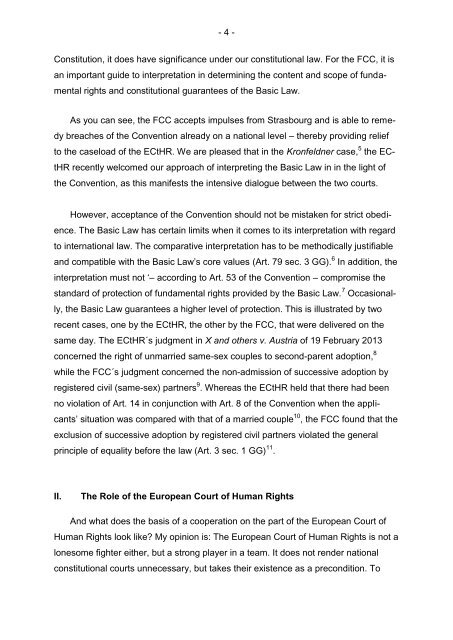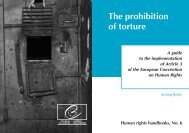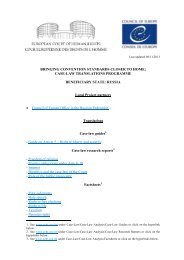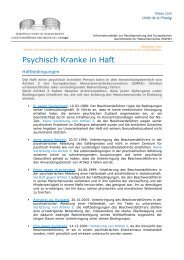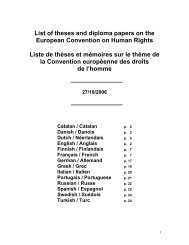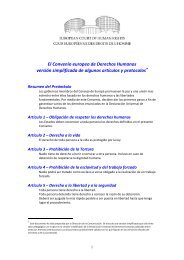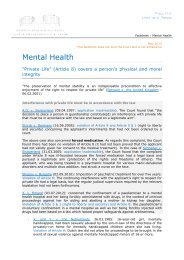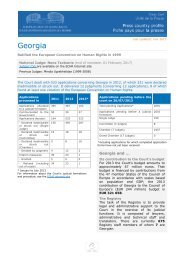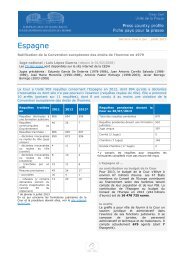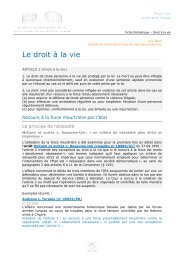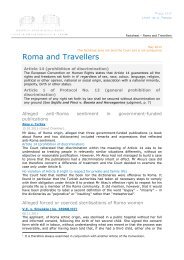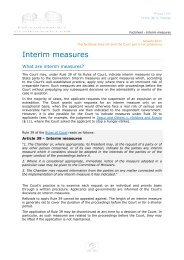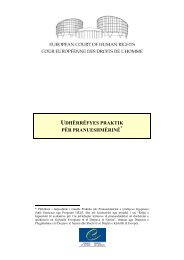Speech by Andreas Voßkuhle - European Court of Human Rights
Speech by Andreas Voßkuhle - European Court of Human Rights
Speech by Andreas Voßkuhle - European Court of Human Rights
Create successful ePaper yourself
Turn your PDF publications into a flip-book with our unique Google optimized e-Paper software.
- 4 -<br />
Constitution, it does have significance under our constitutional law. For the FCC, it is<br />
an important guide to interpretation in determining the content and scope <strong>of</strong> fundamental<br />
rights and constitutional guarantees <strong>of</strong> the Basic Law.<br />
As you can see, the FCC accepts impulses from Strasbourg and is able to remedy<br />
breaches <strong>of</strong> the Convention already on a national level – there<strong>by</strong> providing relief<br />
to the caseload <strong>of</strong> the ECtHR. We are pleased that in the Kronfeldner case, 5 the ECtHR<br />
recently welcomed our approach <strong>of</strong> interpreting the Basic Law in in the light <strong>of</strong><br />
the Convention, as this manifests the intensive dialogue between the two courts.<br />
However, acceptance <strong>of</strong> the Convention should not be mistaken for strict obedience.<br />
The Basic Law has certain limits when it comes to its interpretation with regard<br />
to international law. The comparative interpretation has to be methodically justifiable<br />
and compatible with the Basic Law’s core values (Art. 79 sec. 3 GG). 6 In addition, the<br />
interpretation must not ‘– according to Art. 53 <strong>of</strong> the Convention – compromise the<br />
standard <strong>of</strong> protection <strong>of</strong> fundamental rights provided <strong>by</strong> the Basic Law. 7 Occasionally,<br />
the Basic Law guarantees a higher level <strong>of</strong> protection. This is illustrated <strong>by</strong> two<br />
recent cases, one <strong>by</strong> the ECtHR, the other <strong>by</strong> the FCC, that were delivered on the<br />
same day. The ECtHR´s judgment in X and others v. Austria <strong>of</strong> 19 February 2013<br />
concerned the right <strong>of</strong> unmarried same-sex couples to second-parent adoption, 8<br />
while the FCC´s judgment concerned the non-admission <strong>of</strong> successive adoption <strong>by</strong><br />
registered civil (same-sex) partners 9 . Whereas the ECtHR held that there had been<br />
no violation <strong>of</strong> Art. 14 in conjunction with Art. 8 <strong>of</strong> the Convention when the applicants’<br />
situation was compared with that <strong>of</strong> a married couple 10 , the FCC found that the<br />
exclusion <strong>of</strong> successive adoption <strong>by</strong> registered civil partners violated the general<br />
principle <strong>of</strong> equality before the law (Art. 3 sec. 1 GG) 11 .<br />
II.<br />
The Role <strong>of</strong> the <strong>European</strong> <strong>Court</strong> <strong>of</strong> <strong>Human</strong> <strong>Rights</strong><br />
And what does the basis <strong>of</strong> a cooperation on the part <strong>of</strong> the <strong>European</strong> <strong>Court</strong> <strong>of</strong><br />
<strong>Human</strong> <strong>Rights</strong> look like? My opinion is: The <strong>European</strong> <strong>Court</strong> <strong>of</strong> <strong>Human</strong> <strong>Rights</strong> is not a<br />
lonesome fighter either, but a strong player in a team. It does not render national<br />
constitutional courts unnecessary, but takes their existence as a precondition. To


